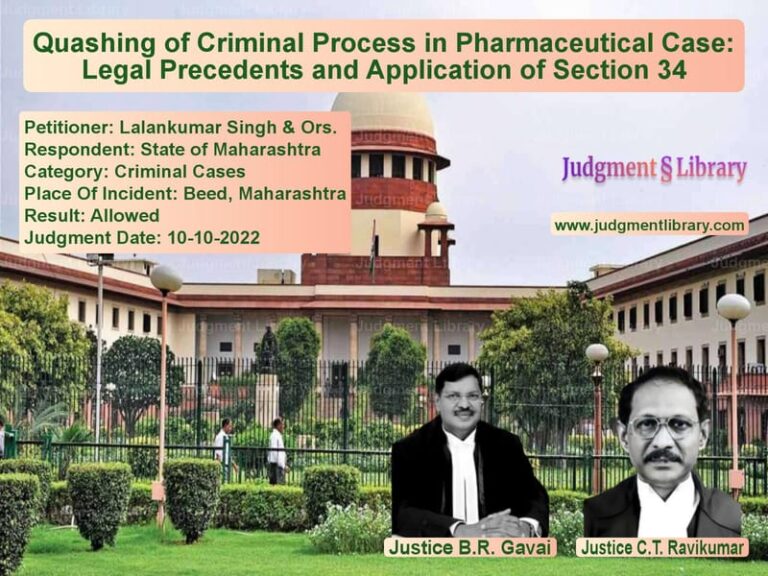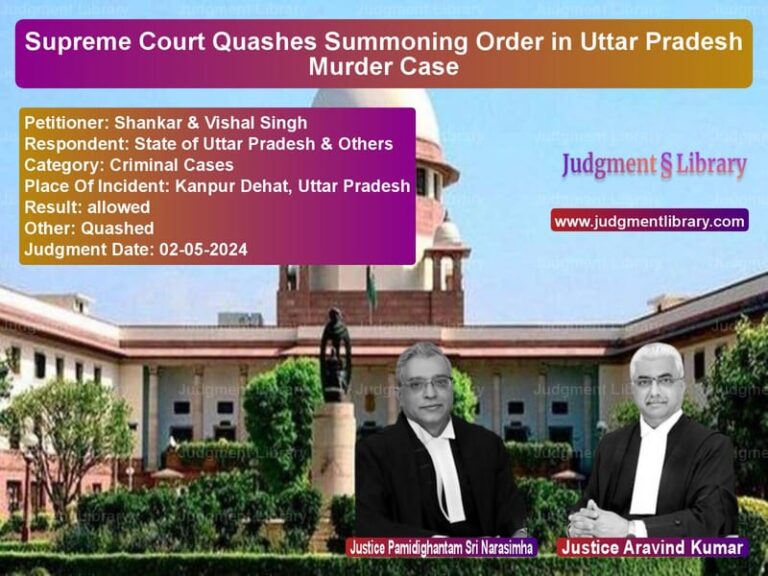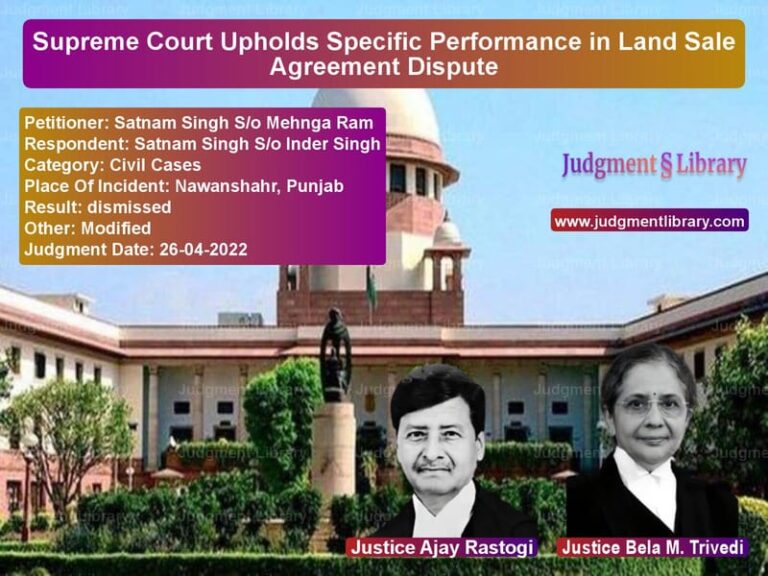Specific Performance Denied: Supreme Court Upholds Trial Court Decision in Property Dispute
The Supreme Court of India, in its judgment in Dalip Singh vs. Bhupinder Kaur, addressed a dispute over the specific performance of a contract for the sale of property. The Court ruled in favor of the appellant, Dalip Singh, setting aside the Punjab and Haryana High Court’s order, which had erroneously overturned the concurrent findings of the trial court and the lower appellate court.
Background of the Case
The dispute arose when Bhupinder Kaur (the respondent) filed a suit for specific performance of an agreement to sell, allegedly executed by Dalip Singh (the appellant) on February 25, 1999. According to the agreement, the suit property was to be sold for ₹1,50,000, out of which ₹92,000 was purportedly paid as earnest money.
The case progressed as follows:
- The trial court dismissed the suit, citing suspicious circumstances and inconsistencies in the plaintiff’s claims.
- The lower appellate court upheld the trial court’s decision, reaffirming that Bhupinder Kaur failed to prove her case.
- The Punjab and Haryana High Court, in a second appeal, reversed the concurrent findings without thoroughly examining the evidence.
- Dalip Singh, aggrieved by the High Court’s ruling, appealed before the Supreme Court of India.
Key Legal Issues Considered
- Whether the High Court was justified in interfering with the concurrent findings of fact recorded by the lower courts.
- Whether Bhupinder Kaur had proved the execution of the sale agreement and the payment of earnest money.
- Whether the transaction price was fair, given the market value of the property at the time of the alleged agreement.
Arguments by the Appellant (Dalip Singh)
- The sale agreement was surrounded by suspicious circumstances and was never executed by Dalip Singh.
- The trial court rightly found that Bhupinder Kaur failed to prove the payment of ₹92,000 as earnest money.
- The agreed price of ₹1,50,000 was significantly lower than the market value of ₹5,00,000, casting doubt on the authenticity of the transaction.
- The High Court erred in reversing the well-reasoned findings of the lower courts without discussing the evidence in detail.
Arguments by the Respondent (Bhupinder Kaur)
- The sale agreement was validly executed and signed by Dalip Singh.
- The payment of ₹92,000 was made, as recorded in the agreement.
- The High Court correctly inferred from the pleadings that the sale agreement was genuine.
Supreme Court’s Observations
The Supreme Court found that the High Court had erred in its approach by setting aside the concurrent findings of fact without discussing the evidence. The Court emphasized:
“We fail to understand how the High Court could come to this conclusion. In the written statement, the defendant had denied the averments made in the plaint. There was no admission by him of any of the allegations.”
The Court further noted that Bhupinder Kaur had claimed to have withdrawn ₹92,000 from the Oriental Bank of Commerce but failed to produce her passbook to substantiate this claim. Moreover, the defendant presented a bank witness who confirmed that no such transaction occurred.
Final Judgment and Directions
- The Supreme Court allowed the appeal and set aside the Punjab and Haryana High Court’s judgment.
- The trial court’s decision to dismiss the suit for specific performance was restored.
- The Court reaffirmed that a second appellate court cannot overturn concurrent findings of fact without strong reasons.
- Pending applications related to the case were also disposed of.
Implications of the Judgment
This ruling carries significant implications for property disputes and specific performance cases in India:
- Burden of Proof on the Plaintiff: The plaintiff must convincingly prove the execution of a sale agreement and the payment of earnest money.
- High Courts Must Exercise Caution: Second appellate courts should not overturn concurrent findings of fact unless there are compelling reasons.
- Documentary Evidence is Crucial: Producing bank records and other documentation is essential to substantiate financial transactions.
- Suspicious Agreements Are Subject to Greater Scrutiny: If the transaction price is significantly lower than market value, courts may view the agreement with suspicion.
Conclusion
The Supreme Court’s decision in this case reaffirms the importance of procedural integrity in property disputes. By restoring the trial court’s verdict, the Court has upheld the principle that specific performance cannot be granted based on unproven claims and suspicious agreements. The ruling serves as an important precedent for future cases where the authenticity of sale agreements is challenged.
Petitioner Name: Dalip SinghRespondent Name: Bhupinder KaurJudgment By: Justice Madan B. Lokur, Justice Deepak GuptaJudgment Date: 23-02-2018
Don’t miss out on the full details! Download the complete judgment in PDF format below and gain valuable insights instantly!
Download Judgment: Dalip Singh vs Bhupinder Kaur Supreme Court of India Judgment Dated 23-02-2018.pdf
Direct Downlaod Judgment: Direct downlaod this Judgment
See all petitions in Property Disputes
See all petitions in Specific Performance
See all petitions in Contract Disputes
See all petitions in Judgment by Madan B. Lokur
See all petitions in Judgment by Deepak Gupta
See all petitions in allowed
See all petitions in Quashed
See all petitions in supreme court of India judgments February 2018
See all petitions in 2018 judgments
See all posts in Civil Cases Category
See all allowed petitions in Civil Cases Category
See all Dismissed petitions in Civil Cases Category
See all partially allowed petitions in Civil Cases Category







